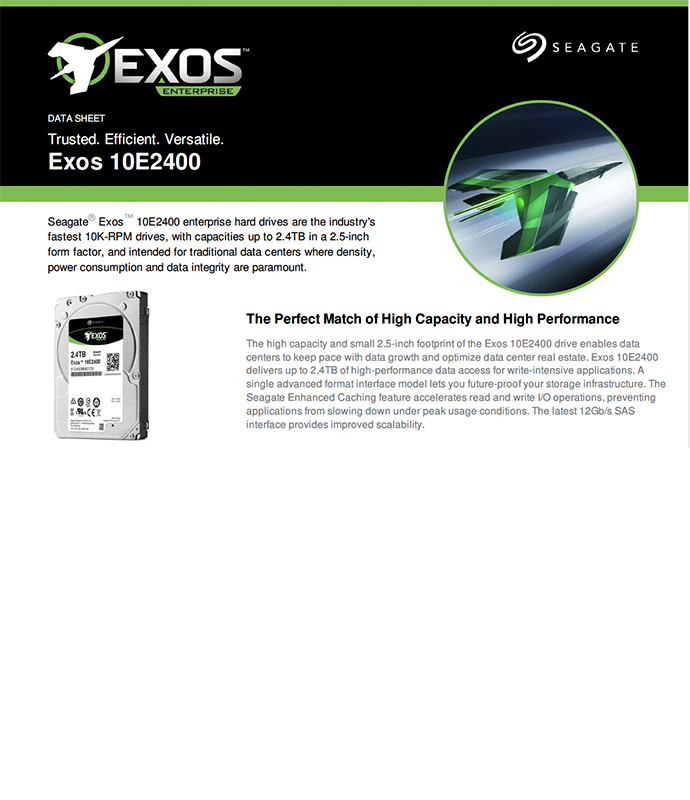




Seagate
Seagate ST1200MM0009 1.2TB 10K SAS 2.5" Enterprise Hard Drive | Server Storage
Brand New, Factory Sealed | In Stock | Bulk Orders Available
The Seagate ST1200MM0009 is a high-performance enterprise-class 2.5" hard drive engineered for reliability, speed, and efficiency in mission-critical data environments. With a 10,000 RPM spindle speed and 12Gb/s SAS interface, this drive delivers fast, consistent throughput—ideal for servers, storage arrays, and data center applications.
Designed for 24/7 operation, the Enterprise Performance 10K series provides a strong balance of capacity and performance with 1.2TB of storage in a compact form factor. This allows businesses to maximize rack density while optimizing power usage and thermal efficiency. Whether handling transaction-heavy workloads, database queries, or virtualization tasks, the ST1200MM0009 offers dependable performance with enterprise-level durability.
Specifications
Product Features
Compatibility
Shipping & Returns
- Free Shipping: We currently offer free Economy Shipping within the continental U.S. with no minimum order required. Expedited shipping is available at standard carrier rates.
- Same-Day Shipping: Order placed before 2PM PST will ship the same day. Orders received after this time will ship the following business day.
- Hassle-Free Returns: If you're not completely satisfied with your purchase, simply return it within 10 days for a hassle-free refund or exchange.
Product Overview and Benefit
The Perfect Match of High Capacity and High Performance
Maximize Storage Investments for the Long Haul
Industry-Leading Data Security Features
Helpful Resources
Find success stories, datasheets, and references to help you achieve your goals.
Frequently Asked Questions
Frequently asked questions about Enterprise Hard Drives (HDD) and Solid-State Drives (SSD), including what they are, how they are used, performance consideration and tips for choosing the right solution.
1. What are enterprise hard drives and SSDs?
Enterprise hard drives and SSDs are high-performance, high-reliability storage solutions designed for use in data centers and business-critical applications.
2. Are enterprise hard drives reliable?
Yes, enterprise hard drives are designed to be highly reliable and durable, suitable for data centers and enterprise environments. They typically feature enhanced error correction, vibration resistance, and longer lifespans compared to consumer drives. Enterprise drives are built to handle continuous 24×7 operation, making them a smart choice for critical data storage needs.
3. What is the difference between NAS and enterprise hard drives?
Network-attached storage (NAS) and enterprise hard drives differ primarily in their intended use and design features. NAS drives are optimized for lower power consumption, quieter operation, and ideal for small-to-medium business or home environments. Enterprise drives, which are built for higher performance, reliability, and endurance—are designed to handle 24×7 operation in demanding data center and enterprise settings.
4. What factors should be considered when selecting an enterprise hard drive for a specific application or workload?
To choose an enterprise hard drive for a specific application or workload, keep the following factors in mind:
- Performance requirements, such as read/write speeds and IOPS are crucial, especially for data-intensive applications.
- Capacity needs must align with the storage demands of your workload.
- Reliability and durability are essential, as enterprise drives should withstand continuous 24×7 operation.
- Compatibility with your existing hardware and RAID configurations is also important.
- Power consumption and cooling requirements should be considered to guarantee efficient operation within your data center environment.
- Cost and warranty terms should align with your budget and long-term maintenance plans.
5. How does an enterprise hard drive improve data reliability and integrity?
Enterprise hard drives improve data reliability and integrity through several advanced features. They incorporate enhanced error correction codes (ECC) that detect and correct data errors, ensuring data remains accurate and intact. These drives are also designed with improved mechanical structures to minimize vibrations, which can cause read/write errors. Optimized for RAID configurations, they prevent data loss and promote redundancy, further safeguarding data. Additionally, enterprise drives benefit from advanced firmware that includes regular updates and sophisticated algorithms to manage data more effectively.
6. What are the key differences between enterprise hard drives and consumer-grade hard drives?
Enterprise hard drives differ from consumer-grade hard drives in several key areas:
- Reliability: Enterprise drives are designed for continuous 24×7 operation with a higher mean time between failures (MTBF).
- Performance: The enterprise hard drives offer faster data transfer rates and lower latency.
- Durability: They offer enhanced error correction, vibration resistance, and robust construction.
- Features: They include advanced features like RAID optimization and better firmware.
- Warranty: Enterprise hard drives come with longer warranties compared to consumer drives.
7. How does an enterprise hard drive improve data reliability and integrity?
Enterprise hard drives improve data reliability and integrity through several advanced features. They incorporate enhanced error correction codes (ECC) that detect and correct data errors, ensuring data remains accurate and intact. These drives are also designed with improved mechanical structures to minimize vibrations, which can cause read/write errors. Optimized for RAID configurations, they prevent data loss and promote redundancy, further safeguarding data. Additionally, enterprise drives benefit from advanced firmware that includes regular updates and sophisticated algorithms to manage data more effectively.
8. How do enterprise hard drives handle power loss or failures?
Power loss or failures are handled through several robust mechanisms. They often include features like power loss protection (PLP) that use capacitors to provide enough power to complete pending write operations and safely store data in non-volatile memory. Advanced error correction and recovery algorithms also help maintain data integrity. Additionally, enterprise hard drives are designed to restart after power failures quickly and safely, minimizing downtime and data corruption risks. Seagate enterprise drives incorporate such technologies to ensure data reliability and system resilience in power-loss scenarios.





